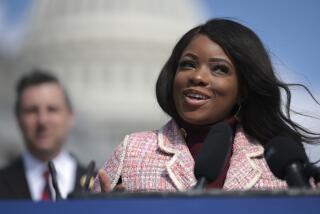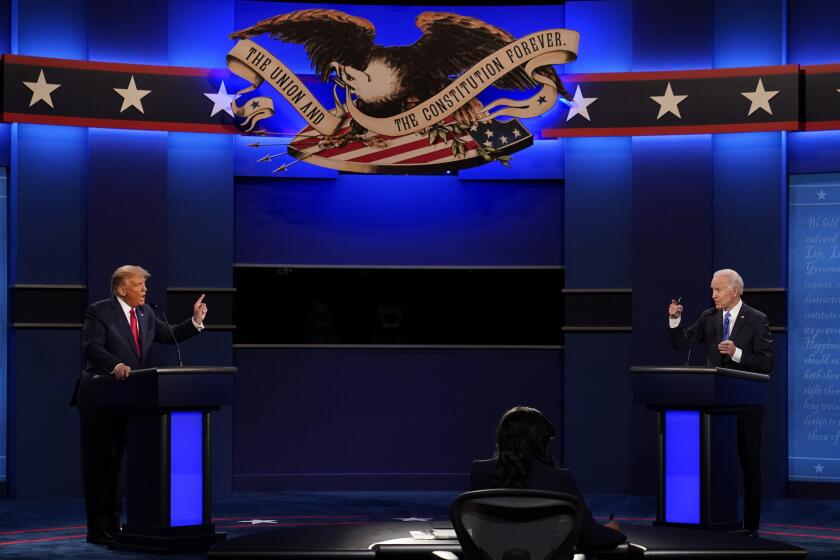Bush Drawn Into TV Ad War
President Bush and John F. Kerry began a television ad duel this week that spotlights the incumbent in a place many of his predecessors studiously avoided so early in an election year -- in the middle of a bare-knuckle fight with the challenger.
Far from pursuing a “Rose Garden” strategy -- in which presidents use the prestige and aura of the White House to stand above the hurly-burly of the campaign -- Bush is going toe-to-toe with his presumed Democratic challenger more than seven months before the election.
That’s just where Kerry wants the president, the Democrat’s aides say.
“Standing in the Rose Garden as president puts [Bush] in a very different place,” said Michael Meehan, a senior Kerry strategist. “To have him give that up helps level the playing field and improves our chances.”
Republicans disagree on whether Bush has joined the battle at the correct time. Some have been spoiling for him to lash back at Democrats who have been attacking him for months, while others say it would be wiser to wait until voters are more focused on the race.
Fully joining the exchange with the president, Kerry planned to air his first TV commercial of the general election today. It accuses Bush of “misleading America” about Kerry’s tax policy in an advertisement, released Thursday, that depicts Kerry as seeking to raise taxes by “at least $900 billion.”
“Once again, George Bush is misleading America. John Kerry has never called for a $900-billion tax increase,” a narrator in the Kerry ad says. “He wants to cut taxes for the middle class. Doesn’t America deserve more from its president than misleading, negative ads?”
Through their commercials, Kerry and Bush will be squaring off over the next week in as many as 16 states.
The sharpening tone has risks for both candidates. Kerry -- seeking to unseat an incumbent who has been personally popular for much of his term -- must be careful not to let himself be defined as the angry challenger. Bush, meantime, could lose some of the luster that the White House traditionally confers on its occupant if his attacks on Kerry are perceived as undignified.
Bush already is ahead of the pace of his two predecessors. President Clinton did not offer unsolicited criticism targeting Bob Dole by name until July 1996, the Washington Post noted this week, while Bush’s father waited until August 1992 to take on Clinton by name.
Analysts said the younger Bush was forced to engage Kerry sooner than he might have preferred.
“The risk when you’re in a tough race is: You can take the high road and lose, or take the low road and have a chance,” said Charles Cook, an independent political analyst in Washington. “I don’t think President Bush has the luxury of remaining above the fray.”
Bush’s challenge is heightened by a new legal requirement. Under the McCain-Feingold law, enacted in 2002, Bush is the first president who must vouch for the content of his TV ads in his own voice and with his picture prominently displayed on screen.
That means that some of the harshest attacks, on both sides, may come via other media that aren’t covered by the disclosure rule, such as direct mail, e-mail or telephone calls. Or independent organizations may deliver the heavy blows on TV.
Nonetheless, Bush’s campaign launched the first hard-hitting critique of Kerry of the general election season, months after Kerry first used a sharp tone to take on Bush during the Democratic primary season.
Some question Bush’s decision to mix it up with Kerry now.
“If you’re in the attack mode, it puts you in a political cast in a way that could have some unintended consequences,” said Don Sipple, a GOP media strategist who advised Bush on ads when he was governor of Texas. “Viewers may perceive this as way too early to be in the sandbox.”
The risks the president faces were illustrated by a survey released Friday by the University of Pennsylvania’s Annenberg Public Policy Center. The survey found that 54% of the public nationwide considered inappropriate Bush’s use of images from Sept. 11, 2001, in his first round of TV ads. Just 39% considered ads linked to the attacks appropriate. The margin of error in the survey was plus or minus 3 percentage points.
One image he used was of firefighters carrying flag-draped remains from the wreckage of the World Trade Center. Bush allies say the topic of Sept. 11 -- and the carnage of that day in lower Manhattan -- changed public policy and can’t be avoided.
Kerry, for his part, headed into treacherous ground this week with a comment overheard Wednesday that described his Republican critics as “lying” and “crooked.” His ad Friday had a slightly milder tone.
Kerry’s ad was perhaps as significant for what it omitted as for what it addressed. It did not rebut Bush’s claim that Kerry is soft on terrorism or defense, despite the Massachusetts senator’s frequent challenge to the Republicans to “bring it on” on national security.
Instead, Kerry focused on defending himself against the charge that he would raise taxes by at least $900 billion. Aides say they aren’t worried that the public will perceive Kerry as weak on national security. They are sensitive, however, to the GOP contention that Kerry is a typical “tax-and-spend” liberal.
The Bush campaign based its tax-raising charge on two Kerry proposals: to expand healthcare coverage at an estimated 10-year cost of $900 billion, and to raise taxes on Americans who earn more than $200,000 a year. But Kerry’s tax plan would not cover the full cost of the healthcare plan, and his campaign has not said exactly where he would find the money. Bush officials say it would have to come from a tax increase; the Kerry camp says that’s not true and that it will release a detailed budget soon.
The fear that voters will see their candidate as dragging the campaign into the mud was evident from both the Republicans and Democrats this week -- as they aired allegations of mudslinging as enthusiastically as they fought over more substantive matters. Recent history informed them: Former Vermont Gov. Howard Dean and Rep. Dick Gephardt (D-Missouri) collapsed in the Democratic primaries after brutalizing each other on the airwaves.
But some analysts say the sparring so far has been tame. Vaughn Ververs, editor of the Hotline, an online journal of political news and gossip, wrote Friday that nothing in the 2004 campaign has approached the harshest campaign tactics of years past.
In 1988, Republicans aired the “Willie Horton ad,” showing the picture of a black repeat felon furloughed from a Massachusetts prison, to help defeat Democratic nominee Michael S. Dukakis. In 1964, President Johnson’s campaign ran a commercial that showed a girl plucking petals from a daisy, followed by a missile launch and a nuclear mushroom cloud, to raise doubts about Republican nominee Barry Goldwater’s ability to steer the country through the Cold War.
By contrast, Ververs wrote, the uproar over “negative” tactics this year appears out of proportion to the charges and countercharges that have occurred.
“The complete disconnect between the atmosphere described and what’s actually taking place is deep and wide,” Ververs wrote. “The real ‘nasty’ stuff may be coming, but it certainly isn’t here yet.”
More to Read
Get the L.A. Times Politics newsletter
Deeply reported insights into legislation, politics and policy from Sacramento, Washington and beyond. In your inbox three times per week.
You may occasionally receive promotional content from the Los Angeles Times.







